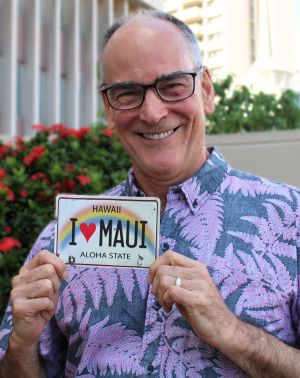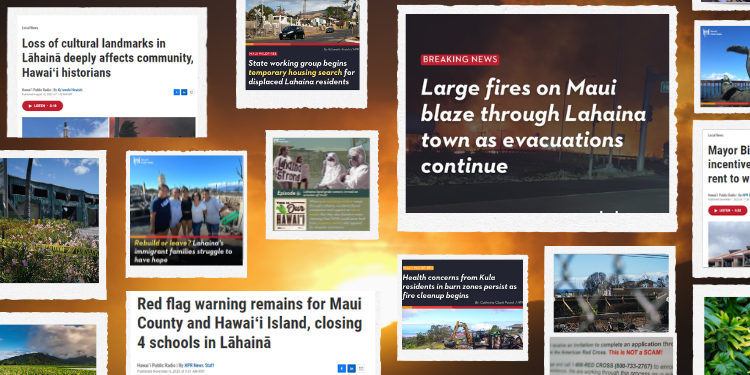Covering Maui’s Recovery from Wildfires: A Q&A with Hawai'i Public Radio’s Bill Dorman
December 6, 2023
Since wildfires whipped through the West Maui town of Lahaina in August, killing nearly 100 people and leaving behind a large path of destruction, Hawai’i Public Radio and PBS Hawai’i have worked to connect Hawaiians with news and public affairs programming about the fires, as well as community engagement events to support the recovery efforts.
In the immediate aftermath, both organizations shared news, timely updates, press conference coverage and information, on air, on their websites and on social media. PBS Hawai’i got an FCC waiver to participate in a statewide broadcast of “Maui Ola: A Benefit Concert for Maui,” and hosted a 90-minute discussion with more than a dozen emergency management experts with a focus on natural disaster preparedness. KĀKOU: Hawai'i’s Town Hall, Are We Really Ready for a Natural Disaster? aired on September 28 and is available on demand on the PBS Hawai’i website, with links to trusted sources for disaster preparedness.
Hawai’i Public Radio was also granted an FCC waiver to hold a two-day on-air campaign to raise funds for the Maui recovery efforts. The station continues to provide local news updates and information on the wildfire response and recovery, with funding support from the Corporation for Public Broadcasting. HPR’s journalism, public affairs coverage, and community engagement events provide critical information and space for civil conversation about the efforts of Maui and its residents to recover.
CPB caught up with Bill Dorman, Vice President of News, to learn about HPR’s coverage and plans.
Q: You hired a Maui County beat reporter, HPR’s first not based on Oahu, just before the fires broke out. How has the fire changed your plans for this reporter and for your newsroom?
A: The fires not only immediately changed our coverage, but they shifted the way we’re looking at the next year and a half and longer. The story of the people of West Maui has touched every part of Hawai’i and will continue to do so. Our reporter, Catherine Cluett Pactol, was already focusing on the collection of islands known as Maui Nui, and she turned her attention to specific stories not only in and around Lahaina, but also in upcountry Maui, another area hit by fires and the loss of power and water and other essentials. We’ve also rotated other reporters into Maui and will continue to do so as we build on our existing relationships and create new ones across Maui.
Q: What are your goals and priorities for your coverage?
A: We want to get local people news and information that is useful and relevant to their lives as they are right now, and also help people tell their stories if and when they’re ready to do so. While we encourage people to share their experiences, we also want to give them space, time, and respect to process what has happened, and in so many cases to grieve for their losses. The last thing we want to do is to force a microphone in front of someone who’s not ready to talk.
Q: What aspects of the recovery have been the most challenging to cover?
A: There is much information to unravel when it comes to some of the specifics of what happened and whether some of the tragic losses may have been avoided. It’s a nuanced story that doesn’t take place in a vacuum—there are historic and cultural aspects to the context for this story. Tourism also remains a challenging topic: This is not just a story of numbers and business; it’s layered with a lot of emotions. But the economic side is vital to the island’s recovery, not only in West Maui but in other parts of the island.

Q: Is there any coverage that you’re particularly proud of?
A: I’m proud of the way our entire news team has pulled together to cover this story—and to know that we will continue to be with the people of Maui. Every voice that we elevate that may not otherwise be heard is an important part of our coverage. Catherine Cluett Pactol and Kuʻuwehi Hiraishi were both early to the story of community hubs, and our digital team has shared pictures as well as expanded coverage. The team working on our podcast This is Our Hawai'i addressed false rumors that applying for FEMA aid could result in the government seizing your land, while also reflecting the very real uncertainty that displaced property owners face about their futures.
Q: What have you and your staff learned from covering the wildfire and recovery?
A: It’s been humbling to talk with people who are still dealing with the sharp pain of loss and grief, and whose first thoughts immediately go to how they can help others in their community. It reminds us of our responsibility to make sure these people and the situations they are still dealing with are not forgotten. It encourages us to increase our efforts to focus on what we can do to bring relevant news and information to the community and help people share their stories.
Q. Given the severe drought fueled by climate change, do you and your staff expect to cover more wildfires in Hawaii, even in places where it has not happened before?
A: Sadly, we do expect that, and not only because of drought. The impacts of climate change often result in a multiplier effect when it comes to potential damages, and they combine with other factors including the spread of invasive species, such as the highly flammable non-native grass that complicated the Lahaina fires. At the same time, we face other climate-related issues from changing wind speeds and weather patterns to rising sea levels.
To subscribe to CPB spotlights, press releases and grant announcements, go to cpb.org/subscribe





